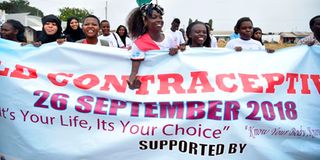Go back to the drawing board, redraft reproductive health policy

Activists take part in a procession at Consolata Grounds in Likoni, Mombasa to mark the World Contraceptive Day on September 26, 2018.
What you need to know:
- The draft policy ignores the government’s commitments on sexual and reproductive health issues.
- The draft is also riddled with problematic language that places blame on survivors of sexual violence.
While Kenya is often hailed for one of the most progressive constitutions, our government is also just as strongly criticised for enacting paper tigers — great policies that are never implemented.
The proposed National Reproductive Health Policy 2020-2030 is particularly problematic: It neither meets the progressive ideals in the Constitution nor lives up to its self-proclaimed goal of “the highest reproductive health status for all Kenyans”.
The Ministry of Health need to go back to the drawing board and ensure the relevant stakeholders are included in redrafting it and that the document addresses all the reproductive health needs of Kenyans in their diversity.
In unpacking what ails the current draft, first, the ministry ignored its own library of policies that provides guidance on a wide variety of sexual and reproductive health (SRH) issues. These include menstrual hygiene, National Family Planning Guidelines, post-abortion care (PAC), the Adolescents Package of Care and Kenya Aids Strategic Framework.
This is particularly worrying for a country where two-thirds of the estimated 345,000 pregnancies among adolescents aged 15-19 are unintended. The vast majority (86 per cent) of them, a recent Guttmacher study shows, occur among adolescents who have an unmet need for modern contraception.
Additionally, the draft policy ignores the government’s commitments on SRH issues. Ignoring Article 2(6) of the Constitution, it makes no reference to regional and international commitments such as the Maputo Protocol, the Convention on the Elimination of Discrimination Against Women (Cedaw) or the East African Community HIV Prevention and Management Act, which all clearly outline Kenya’s willingly chosen obligation to provide SRH services.
Survivors of sexual violence
Despite the preamble stating that it will serve “all persons requiring reproductive health services”, the draft policy excludes vulnerable and marginalised populations and fails to address critical SRH issues. For instance, it omits integration of reproductive and mental health. These often include perinatal depression, suicide, psychological consequences of miscarriage, abortion or complications stemming from childbirth, and postpartum depression. It omits post-abortion care and menstrual hygiene.
Most worrisome, Clause 3.3 states that this policy “supersedes all other previous policies that have pronounced themselves on reproductive health matters in Kenya”. Given the deliberate omission of many critical SRH aspects addressed by existing policies, that would be a fatal erasure of gains.
The draft is also riddled with problematic language that places blame on survivors of sexual violence. Clause 2.3.3 argues that adolescents have increased HIV infections due to “failure to resist forced sex from partners”. It also encourages out-of-court settlement for gender-based violence, which contradicts the position taken by the Sexual Offences Act.
Further, it stigmatises people who have children outside the traditional bounds of the Christian family or marriage by pegging SRH interventions to family institutions (Clause 4.2.3.6) and marginalises those without this restricted set-up. That is also reflected in insistence on obsolete language of “family planning” that has since been globally replaced with ‘contraception’ to recognise those outside marital union who want to avoid unintended pregnancies.
Overall, the genesis and formulation of the policy appears to have been heavily driven by religious sentiments that insist on seeing SRH issues only through the lens of the traditional family. Bodily autonomy and individual efforts to advance SRH must be central theme in the policy. Article 10 (2) of the Constitution articulates our national values — including advancement of human rights, human dignity, and non-discrimination. These are the vakues that should guide the policy.
As it redrafts the policy, the ministry should not make a cosmetic show of public participation of stakeholders but inclusion must be reflected in the resulting interventions.
Ms Kivuvani is the national coordinator, SRHR Alliance. [email protected]





